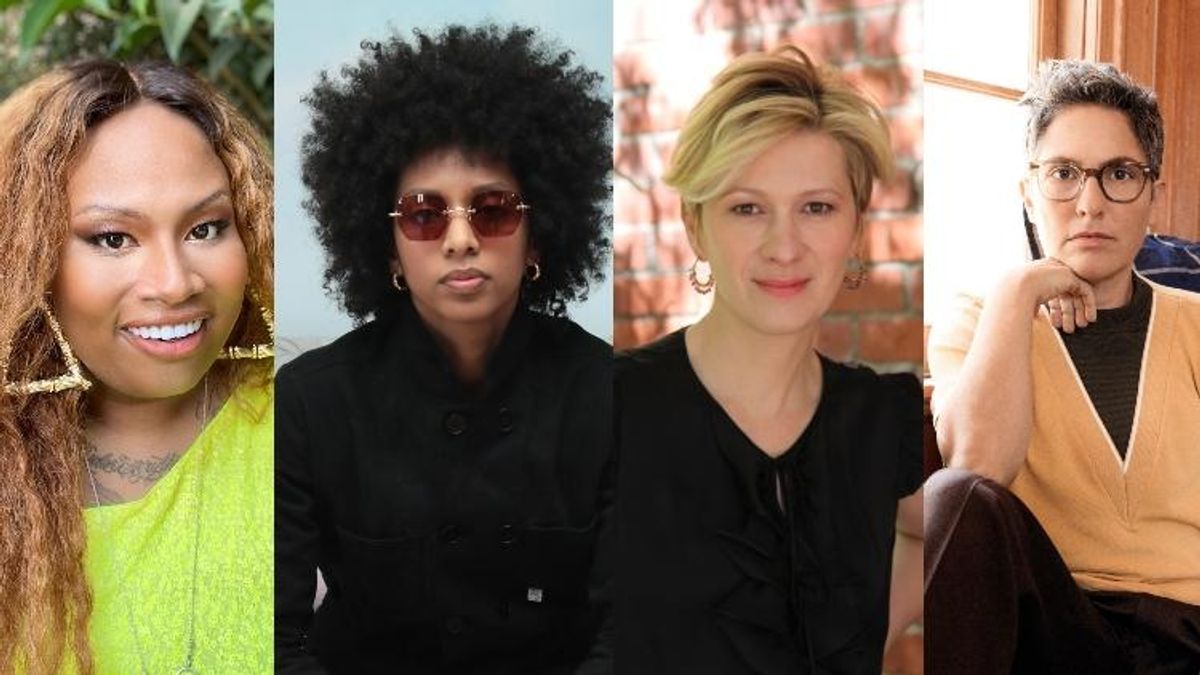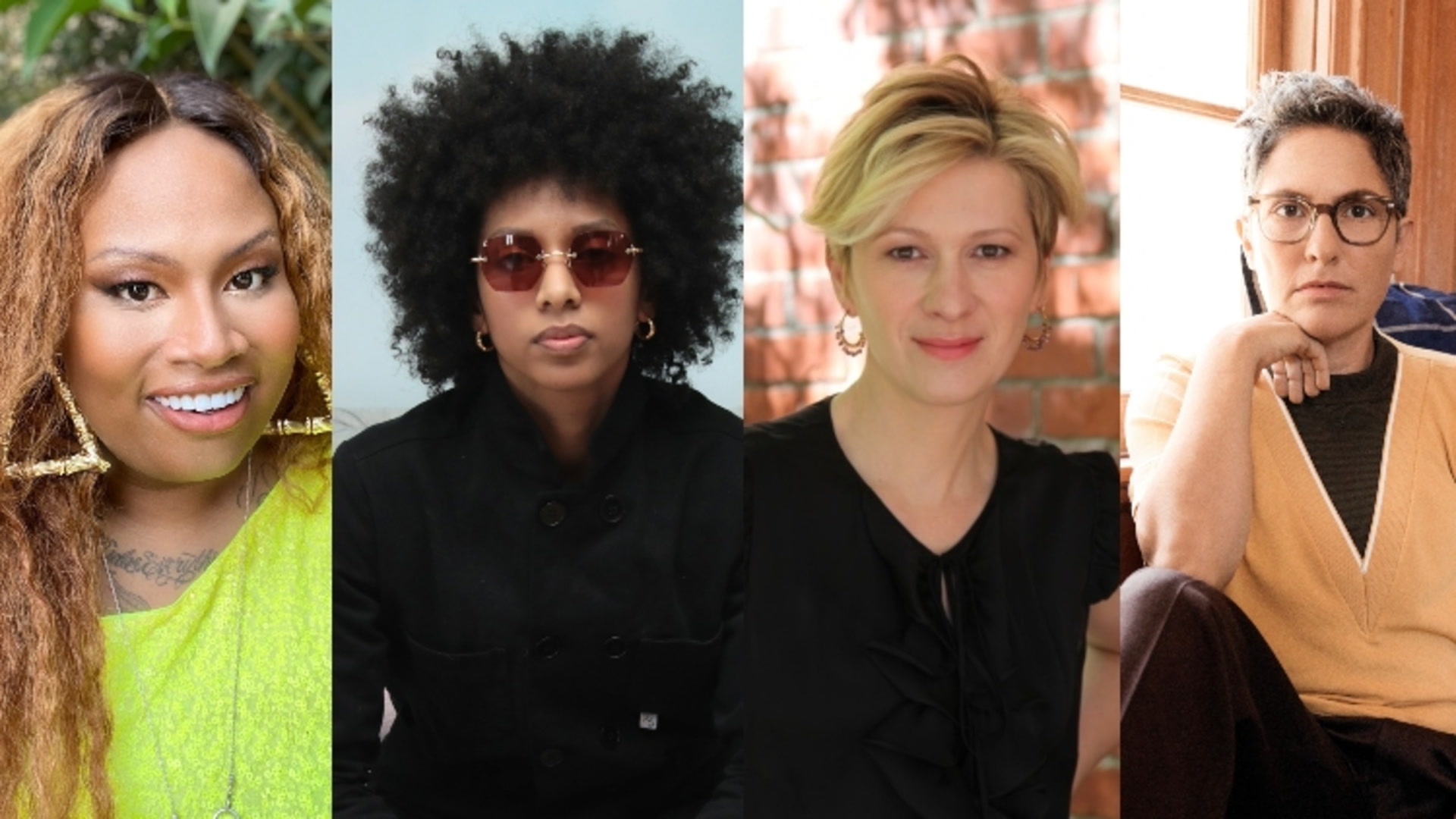
LGBTQ+ Discuss the Work to Be Done for Equality After 2020 Election
Moderator and Out100 cover star Janaya Khan speaks with Joey Soloway, Ashlee Marie Preston, and Kelly Bush Novak in our first-ever Out100 symposium.
The 2020 general election process has been a fraught one. After the insanity of the past four years under Donald Trump, there has been a protracted and contentious counting of votes. And though those initial announcements were a cause for celebration, shortly after came the realization for many that the work was far from over.
"It's been a crazy week," Joey Soloway, Emmy-winning creator of Transparent, says during the first-ever Out100 symposium that we convened earlier this month. Titled "How Do We Come Back From This?" the virtual event featured Out100 cover star Janaya Khan as moderator, leading a discussion between Soloway, trans activist Ashlee Marie Preston, and PR strategist Kelly Bush Novak about what's next for equality and justice.
"I think when [the election results] first happened, I had that day of relief," Soloway continues. "Like, please give me the day that I can say we did it. We had that day on Saturday and I went around and I honked my horn. I honked my horn so hard and yelled so my things out the window and kept going, like, 'Where are people dancing? We gotta dance.' And then the next day, the depression set in. The realization of this 70 million [Trump voters], that we are at the beginning of watching the rise of fascism and the amount of white supremacy in our country, having to realize that. I think a lot of people are at a huge sense of depression and sadness about this place and the size of the work to be done. Yet, I know there is light and I know we will prevail."
Debuting here, the event centered around what moving out of the last four years looks like for culture, politics, the movement, and ourselves. The panelists, who are all advocates for change in their own way, discuss the larger picture about the future of the Black Lives Matter movement, what the queer community has learned from this moment, and how we can heal ourselves and each other so we can rise up stronger and smarter and bolder than before. Of the many questions that were asked, it was important to note how we as queer storytellers can combat the patriarchal power that continues to poison cis male culture around the world. Soloway says a major piece is "centering Black trans women in every move."
"That's how I see it," they say. "If all of the Black trans women we know had all those mansions, everybody else would be fine. If all of the women we know who are Black and who are trans and who are homeless were safe and at home and comfortable, all the other white people will be fine. Everybody else will be fine. So, when people ask, 'Where do we start?' For me, being able to ask people, to understand how otherising works with race and gender at the exact same time is a heart-exploding way into change."

"How do you make an intersectional power movement?" they continue. "How do you rise against tribalism? You know, it's not an equal and opposite reaction. We can't be equal and opposite to Trump. We have to be more than. We have to be better than. We have to be more interesting than, more joyful than. That's the Black trans feminist liberation movement. Where do I want to be personally? Who do I want to be around? What do I care about? That. It makes room for everyone else and everything else. That's my North Star. That's what keeps me going."
"What I've come to realize is that joy is an act of resistance," adds Preston. "When you think about what oppression is meant to do, it's meant to shatter you from the inside out. It's meant to destroy all of your dreams, your hopes, your aspirations, your ability to thrive, your ability to provide, your ability to emit love, light, all of those things. It's meant to destroy that because light exposes everything that's done in the dark. And so, my way of fighting back is realizing that we've been sort of doing this all along where we've imagined that liberation is a destination. You take the 45, you go three miles, etc. But liberation isn't a destination. Liberation is in the now. It's in this very moment. It's each breath, each pause, each moment that I take to find gratitude. And the sacrifices of my ancestors is in each moment.
Preston continues, "On most days, I'm thinking about that 70-something million [Trump voters], but I'm learning, well what about that X amount of million who showed up, who aren't going to turn away. When we think about what liberation looks like, it's in our ability to recruit white people to betray white supremacy. It's in the ability to recruit cisgender people to break down these binary barriers that continue to keep trans folks out. It's in our ability to recruit men to not be so afraid of this false sense of masculinity and to allow it to rule in a way that isn't afraid of strong women or leadership or a matriarchal society."
"There were 181 attacks on the LGBTQ+ community in this administration, from the trans ban on the military to him saying businesses should just be able to discriminate against the gays if they want to," explains Novak. "We can undo that and we will [in the first 100 days]. But we have to be citizens, and we have to fight every single day -- not just every four years."
"Seventeen percent of the LGBTQ+ community voted for Trump, which was mostly white men who care more about economics than anything else," adds Novak. "But I don't think there's 70 million racists and white supremacists in our country that voted for Donald Trump. In fact, the statistics are that it's about 13 percent of that population that are anti-LGBTQ+ white supremacist, racist people. And the majority of them don't think that they are. That's where our opportunity is -- to bring those people along, to educate them, to let them know the harm that has been done and to be patient. We can't write them off."
"There's something, too, that I'm really interested in," says moderator Khan. "There is always at the end of this election time, and with these threads that we're talking about, a sort of discord. For example, there were no celebrations where I am in Inglewood, [California] but there were in Silverlake."
"The Overton window, the lens through which we understand what the norm is and through which policy can be developed, has moved so far to the right that there's there needs to be a kind of rebalancing," they add. "Around the sort of white progressiveness, there is always a [feeling of] 'We need to reach across the aisle.' One of the things that I struggle with is there's always a desire to reach across to bigots before centering the conversation with Black people. Particularly for so many progressives, it's almost as if it's easier to speak to bigots than it is to Black people that enabled these elections to be successful."
Watch the full Out100 symposium above, which is part of 2020's Out100 issue comprised of 100 of the most influential LGBTQ+ names in music, fashion, culture, advocacy, and more. Janelle Monbe, Joe Mantello, Janaya Khan, and Wilson Cruz appear on the covers. Get your own copy and support queer media by purchasing a subscription at our holiday rate of $6 for six issues. The issue is out on newsstands on December 1, 2020. The first-ever Out100 Virtual Honoree Induction Ceremony will be Saturday, November 21, 2020 at 8 p.m. EST. You can watch live on the Out100 Live landing page.







































































